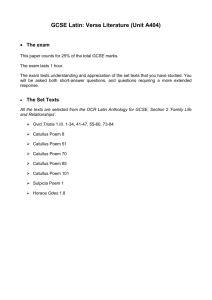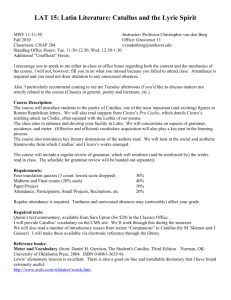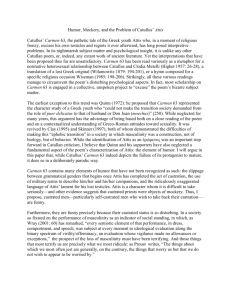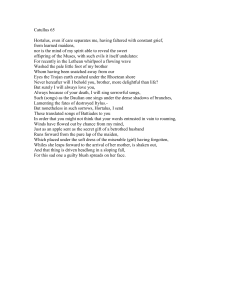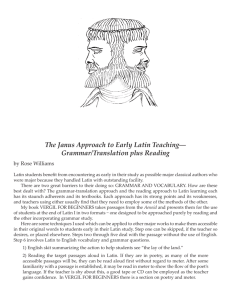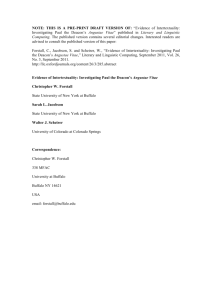W. S. WATT
advertisement
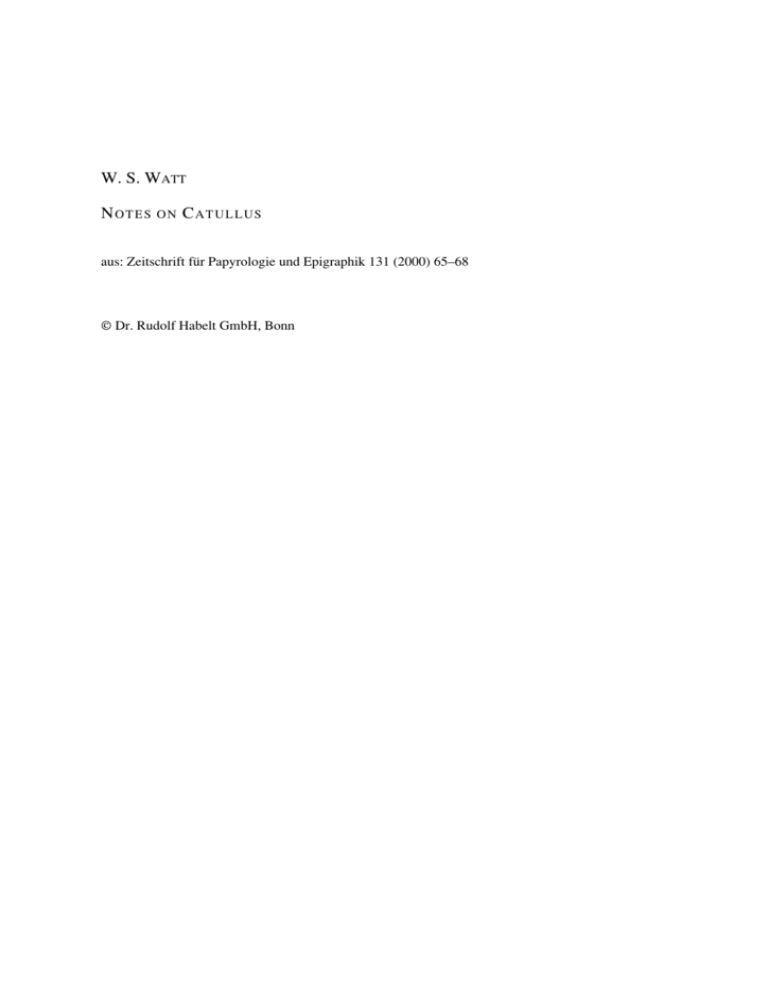
W. S. WATT N OT E S ON C AT UL L US aus: Zeitschrift für Papyrologie und Epigraphik 131 (2000) 65–68 © Dr. Rudolf Habelt GmbH, Bonn 65 N OT E S 2 5 10 ON C AT UL L US * passer, deliciae meae puellae, quicum ludere, quem in sinu tenere, cui primum digitum dare appetenti et acris solet incitare morsus cum desiderio meo nitenti carum nescio quid lubet iocari ut solaciolum sui doloris, credo tum gravis acquiescet ardor, tecum ludere sicut ipsa possim et tristis animi leuare curas. 7. ut B. Guarinus: et V 8. tum Baehrens: ut cum V 9. possim J. Dousa: possem V This is how I should read and punctuate this poem. In line 8, as Fordyce remarks, ut cum ‘could easily have arisen from an adscript uel cum’; and credo with a future indicative (so V) is a completely natural and convincing construction (cf. ThLL IV 1136,42ff.). Whereas the dolor of line 7 is Lesbia’s, the grauis ardor of line 8 is the poet’s; thus 8 corresponds to 7, and 9 to 6 (abba arrangement). Lines 8 and 9 are a paratactic conditional sentence; usually in such a sentence the protasis comes first (e.g. Mart. VIII 55,5 sint Maecenates, non derunt . . . Marones), but the other order is found (e.g. Stat. Theb. XII,342 uincam uolucris, sit adire potestas); tum is prospective, linking the two clauses together and thus to some extent compensating for the absence of meus or mihi with grauis acquiescet ardor. 6,15–17 quare, quicquid habes boni malique, dic nobis; uolo te ac tuos amores ad caelum lepido uocare uersu. Catullus asks Flavius to divulge the name of his girl-friend, so that he can eulogize (or immortalize) them both in his poetry. Nisbet queries uocare on the ground that ‘Catullus cannot “call” anybody to the sky unless he is already there himself’; he would replace it with leuare, which gives good sense but is not very close to uocare. Among other passages he adduces Pindar Isthm. 1,64f., where the poet prays that his hero may be ‘borne aloft on the bright wings of the sweet-voiced Pierides’; this suggests uolare as a possibility in our passage. The ablative with uolare is found at 4,4f. siue palmulis / opus foret uolare siue linteo, and in such usages as curru uolare (Sil. II, 263). 14,4–15 5 10 nam quid feci ego quidue sum locutus cur me tot male perderes poetis? isti di mala multa dent clienti qui tantum tibi misit impiorum. quod si, ut suspicor, hoc nouum ac repertum munus dat tibi Sulla litterator, non est mi male sed bene ac beate, quod non dispereunt tui labores. di magni, horribilem et sacrum libellum! * Unless otherwise stated, ‘Nisbet’ = R. G. M. Nisbet, PCPS 24, 1978, 92–115 (= Collected Papers, Oxford 1995, 76– 100); ‘Harrison’ = S. J. Harrison, PCPS 44, 1998, 88f., 92f. 66 W. S. Watt 15 quem tu scilicet ad tuum Catullum misti, <hoc> continuo ut die periret, Saturnalibus, optimo dierum! Catullus reproaches Calvus for having sent him at the Saturnalia a book of bad poems by various authors which he suspects of being a present made to Calvus by a grateful client. In line 8 no one has made credible sense of repertum, and its combination with nouum is so awkward that Harrison proposes to delete ac as an intrusion from line 10, where it occupies the same metrical position. Few changes could be easier than that which I propose, of repertum to refertum (reinforcing tantum in line 7); in place of the intrusive ac I should write his, i.e. impiis, these bad poets, with the same identification of the poets and their works as we have in line 7 (where Nisbet in his note on 64,403–4 may well be right in changing impiorum to improborum). In line 14 I have inserted the word which (I believe) clears up all the difficulties of this sentence. All attempts to make continuo an epithet of die are doomed to failure; it must be the adverb, construed with what follows. Then optimo dierum, construed with die but separated from it by Saturnalibus in apposition to it, is quite unacceptable unless die is given a qualifier; and hoc is the easiest and most satisfactory word to insert. It is not surprising, in view of the existence of hodie, that temporal hoc die is very rare, and used only for emphasis; it occurs at Liv. XXXI 38,1, and one occasionally finds phrases like ex hoc die, hoc ipso die, hoc praesertim die. In our passage the two appositional phrases give it all the legitimacy it needs. puella nam ~me~, quae meo sinu fugit, amata tantum quantum amabitur nulla, pro qua mihi sunt magna bella pugnata, consedit istic. 37,11–14 Harrison sets out the objections to Heinsius’s nam mi, which is usually adopted by editors, and would read either Avantius’s namque or his own conjecture nam illa. But illa has no palaeographical plausibility. I would merely change me to nc-, i.e. nunc, construed with the main verb consedit. I note that at Prop. IV 3,51, according to Housman (Classical Papers 253), nunc has been corrupted first to tunc (i.e. tc-) and then to te. 64,110–111 sic domito saeuum prostrauit corpore Theseus nequiquam uanis iactantem cornua uentis. Theseus lays low the minotaur. Editors remark on the unusual substantival use of saeuum, but little attempt has been made to address the problem. Nisbet (Collected Papers 203, n. 5) has suggested <ob>saeptum, but I do not think that this is a case for us to be guided by the ‘ductus litterarum’. I believe that saeuum is due to a scribe’s untimely recollection of saeuum monstrum in 101 above; what has been displaced is a synonym of that phrase, viz. taurum, a humanist conjecture last reported by Schwabe (1886); cf. 173 below, indomito . . . tauro. 66,11–17 15 qua rex tempestate nouo auctus hymenaeo uastatum finis iuerat Assyrios, dulcia nocturnae portans uestigia rixae quam de uirgineis gesserat exuuiis. estne nouis nuptis odio Venus? anne parentum frustrantur falsis gaudia lacrimulis ubertim thalami quas intra limina fundunt? Notes on Catullus 67 Editors continue to print, and defend, parentum in line 15 as though it were not quite clear (especially as this line comes immediately after 13–14) that Venus (or uenus) means ‘sex’, gaudia are the pleasures of sex, and intra limina thalami means ‘within the bridal chamber’; there is no place there for parents of the brides, only for their husbands. B. Schmidt’s maritum gives what must be the right sense, but is open to two objections: it is not a very easy change, and the short genitive plural in this word would be both unexampled and improbable. Virorum also would give the right sense, but it would be very hard to explain how it came to be replaced by parentum. That objection, however, would not apply to suorum, erroneously glossed, and later ousted, by parentum; substantival sui, ‘loved ones’, occurs at 58,3; 61,51; 62,45; 64,201. 66,75–78 non his tam laetor rebus quam me afore semper, afore me a dominae uertice discrucior, quicum ego, dum uirgo quondam fuit, omnibus expers unguentis nunc iam, milia multa bibi. The Greek original of these lines (known to us from Ox. Pap. 2258), Callimachus, Coma Berenices, fr. 110 Pf., is as follows: oÈ tãde moi to!!Ænde f°rei xãrin ˜!!on §ke¤nh! é]!xãllv koruf∞! oÈk°ti yijÒmen[o!, ∏! êpo, paryen¤h m¢n ˜t’ ∑n ¶ti, pollå p°pvka litã, gunaike¤vn d’ oÈk ép°lau!a mÊrvn. Berenice’s lock, and the hair-oil which it has, or has not, enjoyed. The text which I have given above is the transmitted text with one change: I have substituted nunc iam for una. Much has been written about the second couplet; of the discussions which I know I have found the most helpful to be that of B. Axelson in Studi in onore di L. Castiglioni (Florence 1960) 13–21 (= Kleine Schriften, Stockholm 1987, 310–314). He rightly retains omnibus, instead of rewriting the line to obtain a reference to Berenice’s womanhood (e.g. uirgo quidem erat muliebribus expers, O. Skutsch), and equally rightly retains milia, instead of adopting, as most people nowadays do, Lobel’s uilia; the Callimachean contrast between the ‘plain’ oils of maidenhood and the unguents of womanhood is thus (I believe) just not reproduced by Catullus. I also agree with Axelson that una, separated as it is from quicum, cannot be right, but I would not follow him in emending it (with Morel) to nuptae; this is due to his desire to reproduce the Callimachean contrast between maidenhood and womanhood; nuptae is not an easy change, and its syntax is opaque (is it a possessive genitive?).With my conjecture the whole contrast between different sorts of oils or unguents disappears, and there remains only the contrast between the abundance of them which the lock used to enjoy and the total lack of them now that it is in the sky, a lack which in lines 91f. it prays Berenice to make good. (For the reluctance of interpreters to admit that Catullus sometimes recedes far from his Greek original see S. West, CQ 35, 1985, 64, n. 24.) Catullus has nunc iam (of the present as opposed to the past) twice elsewhere, both times in a negative sentence: 8,9 nunc iam illa non uolt; 64,143 nunc [tum V] iam nulla uiro iuranti femina credat; for other authors see ThLL VII.1 114,42ff. I do not think that my conjecture is ruled out by the fact to which O. Skutsch (BICS 16, 1969, 41) drew attention, that in the 58 other pentameters of poems 65 and 66 there is no example of a clause ending at the diaeresis; he himself points out that there are two examples elsewhere (67,14 and 68,40), and to prefer on this account the drastic rewriting of the hexameter which he proposed (see above) is surely to strain at a gnat while swallowing a camel. 84,5–6 credo, sic mater, sic liber auunculus eius, sic maternus auus dixerat atque auia. 68 W. S. Watt Arrius’s habit of aspirating the wrong words is presumably shared by his mother and other members of her family. Nisbet makes a convincing case not only against liber but against the other adjectives (like gibber, Cimber, Umber) which have been suggested to replace it. Less convincingly he argues that the only part of speech which can be considered is an adverb (he suggests semper). But it is not difficult to think of possible solutions other than an adverb, e.g. a verb. I do not see why Nisbet dismisses dixit as ‘fatuous’; it is palaeographically unconvincing, but otherwise unobjectionable. A verb in the present or aorist tense here would contrast with the pluperfect dixerat (referring to a previous generation) in the pentameter. A word of the same meaning as dixit and of the same general shape as liber is fatur (f and l are easily confused), and that, I suggest, is what Catullus wrote. 89,1–4 Gellius est tenuis: quid ni? cui tam bona mater tamque ualens uiuat tamque uenusta soror tamque bonus patruus tamque omnia plena puellis cognatis, quare is desinat esse macer? Omnia plena is indeed a ‘sollemnis dictio’ (Baehrens) combined with such nouns as miseriae, lacrimae, luctus, laetitia, timor; occasionally with a personal noun, as at Cicero, Fam. IX 22,4 stultorum plena sunt omnia, ‘the world is full of fools’. But the world is not full of girls related to Gellius. Omnia has apparently never been questioned, but I think that it should be otia; for the sexual connotations of this word see 68,103f. ne Paris abducta gauisus libera moecha / otia pacato degeret in thalamo and the passages of other authors listed in ThLL IX 1176,66–81. Aberdeen W. S. Watt
